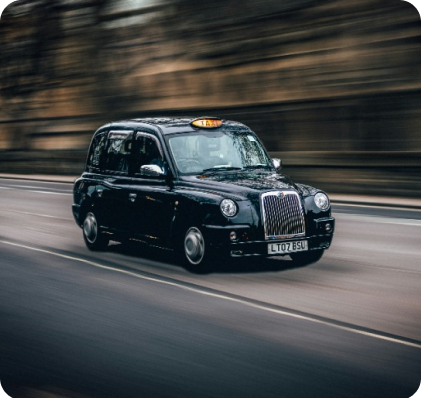
Taxi Insurance
Compare Cheap Taxi Insurance Quotes
- Complete one short form
- Quickly compare quotes
- Find a great deal today

Compare Insurance Quotes from top UK Taxi insurers including:
What is Taxi Insurance?
Taxi insurance is a specific type of vehicle insurance for taxis, both public and private hire, which includes hire and reward cover. It is vital for legal compliance and offers protection against accidents, damages, and liabilities.
This insurance typically encompasses options like third-party, fire and theft, and comprehensive policies. Tailored to the unique needs of taxi services, it ensures that the vehicle, driver, and passengers are safeguarded, providing essential financial security for taxi operators.
Do I need Taxi Insurance?
Yes, if you drive a taxi in the UK, you are legally required to have taxi insurance. This applies whether you’re operating full-time or part-time, and for both public and private hire vehicles. Taxi insurance is different from standard car insurance as it covers the specific risks associated with the commercial transport of passengers, ensuring protection for you, your vehicle, and your passengers.
Who can get Taxi Insurance?
What does Taxi Insurance cover?
Taxi insurance in the UK covers various aspects, including:
- Vehicle Insurance
From third-party-only (covering damage to others) to comprehensive (covering your taxi in accidents). - Public Liability Insurance
For injury claims from passengers and the public. - Fleet Insurance
For multiple taxis, providing consolidated coverage. - Taxi Base Insurance
Covers taxi office premises and may include employers’ liability.
What vehicles can I drive with Taxi Insurance?
With taxi insurance, you can drive a variety of vehicles depending on your specific policy and licensing. This typically includes standard saloon cars, MPVs, minibuses, and even certain specialised vehicles like black cabs or luxury cars for chauffeur services.
The key is ensuring your insurance matches the type of vehicle you intend to use for your taxi service. Always check with your insurance provider to confirm that your vehicle is covered under your specific taxi insurance policy.

How much does Taxi Insurance cost?
The cost of taxi insurance in the UK varies based on several factors, such as the driver’s history, vehicle type, and location. On average, private hire taxi drivers with a clean driving record and no convictions can expect to pay around £180–£200 for a 30-day policy, or approximately £1,600–£1,800 for an annual policy. However, for private hire drivers, the annual cost can range from £1,500 to £3,500, with newer or younger drivers potentially facing the higher end of this spectrum.
These figures are influenced by various factors, including your driving history, points on your license, the value and power of your vehicle, your location, and your age. Even factors like criminal convictions can impact the cost.
Additionally, using telematics or app-based insurance policies like Zego Sense, which reward good driving, can also help in reducing costs.
Looking for the cheapest Taxi Insurance? Get your quote today!
Get QuotesHow can I get cheap Taxi Insurance?
To get cheaper taxi insurance, consider the following strategies:
Research and compare quotes
Start by comparing quotes from specialist insurers. Look for policies that align with your working style, considering factors like coverage levels and optional add-ons. It’s advisable to get quotes from at least three providers for comparison.
Review policy details
Pay close attention to what’s included and what isn’t. Essential protections like hire and reward cover, third-party liability, collision damage, theft, and uninsured driver coverage should be considered. You can also look for extras like breakdown cover, but be mindful of unnecessary add-ons.
Consider telematics insurance
Telematics technology tracks and measures your driving data, such as acceleration, speed, braking, and cornering. This can demonstrate to insurers that you’re a low-risk driver, which can help lower your insurance costs.
Choose the right vehicle
The vehicle you drive can influence your insurance premium. Opt for cars with better safety ratings, lower repair costs, smaller engines, and consider fuel efficiency.
Build a good driving history
A clean driving history with no offences or previous accident claims can significantly reduce your insurance costs. Attending an advanced driving course can also be beneficial.
Opt for an annual policy
Annual policies can be more cost-effective compared to monthly or 30-day policies. While monthly policies offer flexibility, they tend to be more expensive in the long run.
Consider an electric car
Electric vehicles (EVs) can be cheaper to insure due to lower maintenance costs, safety features, and reduced theft risk. Some insurers offer discounts for EVs.

How do I cut the cost of my Taxi Insurance policy?
To effectively reduce the cost of taxi insurance while maintaining adequate coverage, consider these strategies:
Maximise No-Claims Discount
Consistently driving without making insurance claims can significantly lower your premium over time.
Vehicle Choice Matters
Opt for a vehicle in a lower insurance group, which generally means lower premiums. Vehicles with good safety records and modest repair costs are often in these groups.
Annual Payments Over Monthly
Paying for your insurance annually can be more cost-effective than monthly payments, which often include additional interest charges.
Maintain a Clean Driving Record
Avoiding driving convictions is crucial, as these can substantially increase insurance costs.
Secure Overnight Parking
Parking your vehicle in a secure location overnight can reduce the risk of theft or vandalism, thereby potentially lowering insurance premiums.
Enhance Vehicle Security
Adding security features like immobilisers can deter theft and may be viewed favourably by insurers.
When comparing policies, it’s important to balance cost savings with sufficient coverage. The cheapest policy might not always provide the protection you need. By considering these factors, you can find a policy that offers both value and peace of mind.
Looking for the cheapest Taxi Insurance? Get your quote today!
Get QuotesWhat details do I need to provide to get a Taxi Insurance quote?
To get a taxi insurance quote, you typically need to provide the following details:
Personal Information
Your full name, address, date of birth, and contact details
Driving History
Information about any driving convictions, accidents, or claims you’ve had in the past. This includes details of your no-claims discount if applicable.
Taxi License Details
The type of taxi license you hold (public hire or private hire), along with the license number and issuing authority.
Vehicle Information
Make, model, year, and value of the taxi you wish to insure. Modifications to the vehicle, if any, should also be disclosed.
Usage Details
Information on how you intend to use the taxi, including the average number of miles you expect to drive annually and the areas you’ll be operating in.
Security Measures
Details of any security features on your taxi, such as immobilisers, alarms, or tracking devices.
Additional Drivers
If you plan to add other drivers to your policy, their details will also be required.
Insurance providers may require additional information based on their underwriting criteria. It’s important to provide accurate and honest information to ensure you receive a quote that accurately reflects your coverage needs.

What’s the difference between public hire and private hire insurance?
Yes, if you drive a taxi in the UK, you are legally required to have taxi insurance. This applies whether you’re operating full-time or part-time, and for both public and private hire vehicles. Taxi insurance is different from standard car insurance as it covers the specific risks associated with the commercial transport of passengers, ensuring protection for you, your vehicle, and your passengers.
Public Hire Taxi Insurance
- Public hire taxis, such as black cabs or Hackney carriages, can be hailed on the street or picked up from a taxi rank. They do not require pre-booking.
- This type of insurance is typically more expensive due to the higher risk associated with being able to pick up any passenger from the street, which includes potentially unruly or intoxicated passengers, and operating in congested city centres, particularly during late nights and weekends.
- Public hire taxis usually have a sign on the roof indicating “TAXI” and may have a meter inside to calculate fares.
- Private hire taxis, which include services like Uber, must be pre-booked, usually via a phone call, app, or in-person at a taxi booking office. They are not allowed to pick up passengers who hail them on the street.
- The risks associated with private hire taxis are considered lower compared to public hire, as all journeys are pre-booked, providing a more controlled and predictable working environment.
- Private hire taxis are typically not allowed to use taxi ranks designated for public hire taxis.
Both types of insurance cover the legal requirement to carry passengers for a fee and generally include cover for the driver, passengers, the vehicle, and any third parties in case of accidents or damages. However, the specific cover and cost can vary depending on factors such as the driver’s age, driving history, location, and the type of vehicle being insured.
It’s important to choose the appropriate type of insurance based on the taxi service you provide. Failing to have the correct insurance can invalidate your policy and leave you unprotected in the event of an incident.
Which local authorities’ areas can I get Taxi Insurance quotes for?
You can get taxi insurance quotes for various local authorities’ areas across the UK. Here’s a table outlining some of the key areas where taxi insurance is available:
| Area | Local Authority |
|---|---|
| Belfast | Belfast City Council |
| Birmingham | Birmingham City Council |
| Brighton and Sussex | Brighton and Hove City Council, East Sussex and West Sussex County Councils |
| Bristol | Bristol City Council |
| Cambridge and East Anglia | Cambridge City Council, Norfolk, Suffolk, and surrounding areas |
| Cardiff | Cambridge City Council, Norfolk, Suffolk, and surrounding areas |
| Devon & Cornwall | Devon and Cornwall County Councils |
| Edinburgh | City of Edinburgh Council |
| Glasgow | Glasgow City Council |
| Leeds | Leeds City Council |
| Leicester | Leicester City Council |
| London | Greater London Authority |
| Manchester | Manchester City Council |
| Merseyside | Merseyside County Council |
| Newcastle | Newcastle City Council |
| Nottingham | Nottingham City Council |
| Sheffield | Sheffield City Council |
| Stoke | Stoke-on-Trent City Council |
| York | City of York Council |
This table represents some of the major areas in the UK for which you can obtain taxi insurance quotes. It’s important to note that taxi insurance availability and requirements can vary based on the specific regulations set by each local authority. Therefore, when seeking a quote, it’s advisable to check with the insurance provider if they cover the specific area of your operation and to familiarize yourself with the local regulations of that area.
List of Taxi Insurance companies
| Company | Availability |
|---|---|
| Abbey Insurance | Get Quotes |
| Freeway Insurance | Get Quotes |
| Taxi Insurer | Get Quotes |
| InsureTaxi | Get Quotes |
| Riviera Insurance Services | Get Quotes |
| Insurance Revolution | Get Quotes |
| Taxiins | Get Quotes |
| Staveley Head | Get Quotes |
| Zego | Get Quotes |
| XYZ Insurance | Get Quotes |
| Coversure | Get Quotes |
| Konsileo | Get Quotes |
| Acorn Insurance | Get Quotes |
| Patons Insurance | Get Quotes |
Why compare taxi insurance quotes with EasyQuote?
EasyQuote streamlines the process of finding the right taxi insurance by offering a comprehensive platform that provides quotes from various providers. Its user-friendly interface and tailored quote system save time and simplify decision-making, ensuring that you have access to the latest deals and personalised options.
This convenient approach, combined with available support and advice, makes EasyQuote an effective tool for taxi drivers looking to compare insurance policies efficiently and make well-informed choices based on their specific needs.
Frequently Asked Questions
Taxi insurance is typically more expensive than standard car insurance due to several factors. Firstly, taxi drivers spend more hours on the road and cover more miles than average drivers, increasing the risk of accidents. This extensive road usage, often in densely populated or high-traffic areas, adds to the probability of claims being made.
Secondly, taxi insurance covers not just the driver and the vehicle, but also carries additional liability for passenger safety, which standard car insurance doesn’t account for. The nature of carrying passengers for hire and reward brings in more complexities, like dealing with various customers, including potentially unruly or intoxicated passengers, especially late at night.
Additionally, taxis often require a higher level of cover to protect against potential legal claims from passengers. This comprehensive coverage, including public liability insurance, contributes to the higher cost.
Finally, the vehicle type also plays a role. Taxis are typically larger or specially adapted vehicles, which can be more expensive to repair or replace. All these factors combined contribute to the higher premiums for taxi insurance compared to standard car insurance.
When purchasing taxi insurance, several optional extras can be considered to enhance your cover:
- Public Liability Cover: This is crucial for protecting against claims if a passenger is injured or their property is damaged during a trip. While it’s often included in standard policies, some insurers offer extended public liability cover for an additional charge.
- Legal Cover: This provides financial protection for legal expenses that might arise, especially in the event of an accident that is deemed your fault.
- Loss of License Cover: If you lose your taxi driving license, this cover can provide financial support during that period.
- Breakdown Cover: Given the high usage of taxis, having breakdown cover can be a lifesaver, ensuring you’re not left stranded and can get back on the road quickly.
- Windscreen Cover: This covers the cost of repairing or replacing your taxi’s windscreen if it gets damaged.
These extras can provide additional peace of mind and protection in a variety of circumstances, beyond what standard taxi insurance policies offer. It’s important to assess your specific needs and consider these options to tailor your insurance policy accordingly.
Yes, in the UK, it’s generally possible for taxi drivers to use their taxis for personal purposes when not being used for commercial services. However, there are important considerations and requirements to be aware of:
- Licensing and Certification: You need to have a valid driving license and may need to fulfil certain age requirements. Local authorities may require medical examinations and criminal background checks for taxi drivers.
- Vehicle Licensing: The taxi must be registered and meet specific safety standards set by the Department for Transport and enforced by local councils.
- Insurance: If you use your taxi for both work and personal use, you need to inform your insurer. Adequate cover is essential to avoid issues in the event of a claim. Some insurance brokers offer personal use cover as a standard feature in taxi insurance policies, but it’s not always included, so it’s worth checking with your broker.
- Operating Area: There might be specific rules set by your local authority, so it’s imperative to check first. In London, for example, private hire vehicles must be inspected and licensed with Transport for London and meet specific guidelines.
- Personal Use Cover: This is vital as any accident that happens on your own time can significantly affect your ability to earn revenue. This cover ensures you are paid out for damages and can contribute towards the repair of the vehicle.
- Additional Drivers: If other family members, such as a spouse, need to use the taxi for personal reasons, they must be added to the insurance policy and the insurer must be informed.
In summary, while it’s possible to use a taxi for personal use, it requires adherence to licensing, insurance, and local regulations. Always check with your insurer and local authority to ensure compliance and avoid legal issues.
In general, fleet taxi insurance typically requires insuring a minimum of 3 or more taxis. This type of insurance is designed for businesses operating multiple vehicles, offering a more streamlined and potentially cost-effective solution compared to insuring each taxi individually.
However, the specific number of taxis required for fleet insurance can vary between different insurance providers, so it’s advisable to consult with individual insurers for their specific requirements and terms.





